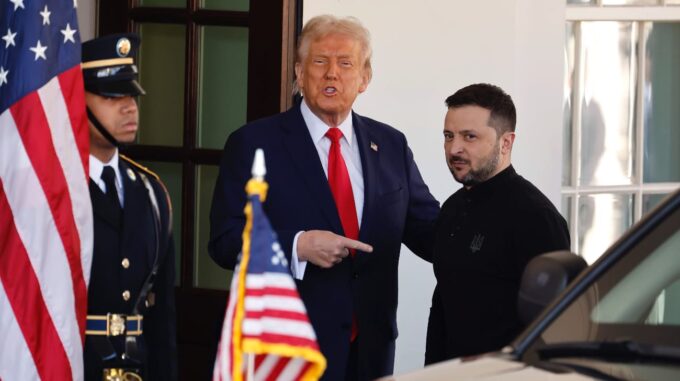Trump’s statement regarding peace in Ukraine sparks outrage and concern: Kyiv considers the American former president’s proposal unacceptable and much more favorable to Russia

In recent days, a new high-profile initiative has attracted attention in the efforts to resolve the conflict in Ukraine — the so-called "final" peace plan, which, according to American sources, was proposed by former U.S. President Donald Trump. It turned out that this document, which was handed to Ukrainian leadership during an informal meeting in Paris last week, contains demands and proposals that effectively entrench Russian occupation and assume significant concessions from Kyiv. A source from American circles reports that the document, which Trump describes as the "final proposal," was presented to Ukrainian officials in the form of a one-page brief. It explicitly recognizes the United States' "de jure" control over Crimea, as well as "de facto" occupation of almost all of Luhansk region and parts of Donetsk, Kherson, and Zaporizhzhia regions. According to the source, whom "Interfax-Ukraine" spoke with, the Ukrainian authorities consider this proposal overly biased and overtly in favor of Russia, as it clearly outlines benefits for the Kremlin without clearly defined concessions or guarantees for Ukraine. Meanwhile, the American plan includes a series of demands that, if implemented by Kyiv, would effectively equate Ukraine with Russia regarding the status of Crimea and the occupied territories. So, what does Trump propose? According to disclosed sources, the main points of the document include: - "De jure" recognition by the U.S. of Russian control over the Crimean Peninsula. - Creation of "non-specific" security guarantees for Ukraine, which supposedly involve the participation of a broad range of European and possibly non-European countries in establishing peacekeeping mechanisms, though without detail. - "Unfreezing" parts of the occupied territories, including a small part of Kharkiv region, as well as lifting sanctions on Russia imposed since 2014, and strengthening economic cooperation with the U.S., including in energy and industrial sectors. - Guarantees that Ukraine will not join NATO, with the possibility of EU membership, representing another compromise within the framework of these agreements. - U.S. control over the Zaporizhzhia Nuclear Power Plant, which will formally remain Ukrainian territory but will be under American authority, with electricity supplied both to Ukraine and Russia. - Demonstration of intentions to sign a new agreement on mineral extraction in Ukraine, using its resources to finance recovery works. Another feature of this plan is its semi-mythical story of creation. According to sources, the document was developed after long consultations between Trump's special envoy, Steve Vitzhoff, and Russian leader Vladimir Putin, who allegedly proposed freezing the front line within the framework of a possible deal. However, the official Ukrainian position remained unchanged and fully critical of any steps leading to capitulation. The Ukrainian delegation, which includes Head of the Presidential Office Andriy Yermak, Defense Minister Rustem Umerov, Foreign Minister Andriy Sibiga, and Deputy Head of the Office Pavlo Paliha — is currently actively discussing only the possibility of a 30-day ceasefire during upcoming negotiations in London, but does not support the proposal put forward by Trump. The Ukrainian authorities’ reaction will soon be official; however, experts and political figures already note that this initiative is another element of information warfare and diplomatic pressure. Concerns have spread in Ukrainian society that such proposals could actually diminish the chances of de-occupation and regaining control over territories held by Kyiv. Meanwhile, in several diplomatic circles, some do not rule out the possibility that this document was created under certain political pressure or as a distraction from urgent issues, particularly the front-line situation and internal country problems. A well-known analyst in Kyiv states that the value of such a plan only reaches the level of journalistic declarations, with minimal real chances for its implementation. It is expected that in the coming days, the United States, Ukraine, and its European allies will continue discussing possible ways to end the war. A further meeting is scheduled in London, where representatives of the Ukrainian delegation, including Andriy Yermak, will discuss next steps. However, given the current situation and the reactions across Ukrainian politics, most experts agree that the document proposed by Trump only complicates the path to real peace and entrenches a deceptive "interim" compromise that could cost Ukraine dearly in the future. Ukrainian politicians and analysts urge not to fall for cheap political tricks and diplomatic provocations, insisting that any agreements should consider the country’s strategic interests and the return of its territories under Ukrainian sovereignty. The main goal remains the protection of independence and sovereignty, and any pact entrenching the factual occupation could reduce the chances for future victory and the restoration of Ukraine’s territorial integrity.

